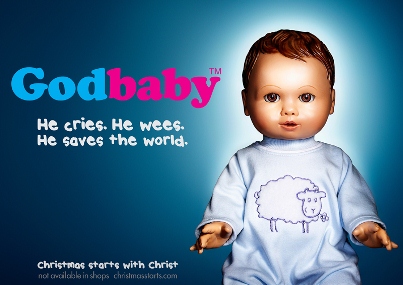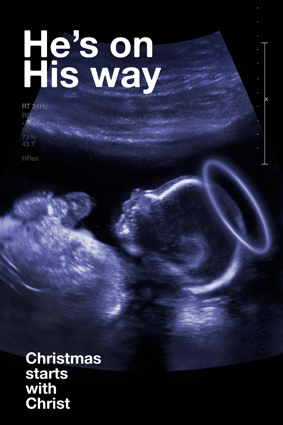Godbaby poster... what do you think?

Rev Mark Fairweather Tall casts a look at the new poster for the popular ‘Christmas Starts with Christ’ campaign and asks whether it will succeed in making the public think more about the true meaning of Christmas
The Churches Advertising Network has released its new Christmas poster containing a very different image of Jesus. The ‘Godbaby’ poster (available from ChurchAds.net) features a baby doll with the caption, “He cries. He wees. He saves the world”
For the more faint of heart, an alternative poster says, “The gift that loves you back”. It has certainly created debate as blogs and tweets are alive with people sharing their view about how good or bad a campaign it is. The Daily Mail has published an article which gives a clue to how some view it with the headline: ‘Is this the best way for Church to 'sell' Jesus? Angry worshippers hit out at Christmas poster campaign’
The ‘Christmas Starts with Christ’ campaign has been running for four years. The aim is to re-tell the Christmas story in modern, secular contexts in order to attract the public’s attention and make them think about the true meaning of Christmas. This has led to some excellent, thought provoking posters - my personal favourite is the ‘Jesus Babyscan’ (pictured below)

Appearing on billboards, bus stops and in many local churches, the posters certainly get a good public airing. Research has shown that 42% of people seeing the posters have said, “it makes me think more about the true meaning of Christmas”
What of this latest campaign? Will it have the same affect? Well, I am no marketing expert and it is too early to say what the reaction of those outside the church will be, but I do have my concerns. Before voicing these, though, it is worth seeking to understand what the poster is intended to portray
Christmas is for many a consumer event – a time of buying and giving presents – and so the poster seeks to portray the ‘Godbaby’ as this year’s must-have gift. In fact, it is saying, that the real present you need is the ‘Godbaby’ and not what money buys. This gift, after all, is not available in shops!
The message about “He cries. He wees. He saves the world” is designed to emphasise the fully divine and yet fully human nature of the incarnation. Some, of course, will be uncomfortable with such a message, preferring the ‘Away in a manger’ version of the Christ-child where ‘little Lord Jesus, no crying He makes’
As I have reflected on this, there is much in the thinking behind the advert that I can see is very clever. I think the ‘Christmas starts with Christ’ campaign is an excellent theme and I am glad that it has been running for a number of years. It is crucial that there are people making the effort to remind people that Christmas is about more than presents, parties and family
However, clever though the advert undoubtedly is, I have concerns about this particular poster. Why?
1) An advert needs to catch the attention and be understood or at least leave you wanting to find out more. Firstly (and I don’t think I am alone) the doll pictured conveys no warmth to me whatsoever. If anything, I think it is a little creepy so it doesn’t encourage me to look at it for anything more than a brief second. This glance is unlikely to lead to any prolonged thought. This is in direct contrast to the poster from 2010 which I will happily look at again and again. How long you look at something makes a huge difference in the potential impact on your thinking.
Also, the cleverness of the advert requires people to think about it. Whilst Christians will understand the link between a baby crying and weeing and Christ’s humanity, I suspect this may be lost on the wider public. Christians understand that Jesus saves the world but will people focus on that as much as the crying and weeing and the doll itself? The fact that the ‘Christmas starts with Christ’ message is in much smaller text on this poster means it is easier to miss with a quick glance.
My question is whether people who aren’t Christians will take enough time to stop, look and think in order for them to reflect on the true meaning of Christmas?
2) It is clear from web-based discussions that this campaign will divide opinions. The possibility (probability?) is that fewer churches will use the poster and therefore there will be fewer opportunities to see it, therefore lessening the impact. A good campaign will be helped by having the widespread support and enthusiasm of the church. I wonder whether this will be forthcoming.
It is true that a good advertising campaign wants to get people discussing it, but will it be the right people talking about it? Yes, it may ruffle Christian feathers and create debate, but what about those queuing at bus stops and out buying presents? Will it catch their attention to the extent they will think more about the true meaning of Christmas? I hope I am wrong, but I am not sure that it will.
The views carried here are those of the author, not of Network Yarmoith, and are intended to stimulate constructive debate between website users
We welcome your thoughts and comments, posted below, upon the ideas expressed here
Click here to read our forum and comment posting guidelines
|